Biblical Stewardship in Leadership: Responsibilities & Ethics Essay
VerifiedAdded on 2022/08/14
|6
|1536
|15
Essay
AI Summary
This essay explores the concept of biblical stewardship in leadership, emphasizing the importance of trust, responsibility, and ethical behavior. It argues that a biblical steward understands their accountability to God and strives to utilize resources for the greater good, fostering a culture of responsibility and promoting well-being within an organization. The essay highlights four key principles of stewardship: recognizing God's ownership of all resources, trusting in people, understanding the responsibility to manage God's creation, and prioritizing the welfare of others over self-interest. By adhering to these principles, leaders can inspire positive change, motivate their teams, and achieve organizational goals while honoring God's intentions. The essay concludes that effective stewardship requires leaders to be faithful, ethical, and focused on the well-being of both the organization and its members, avoiding personal gain and prioritizing the glory of God.
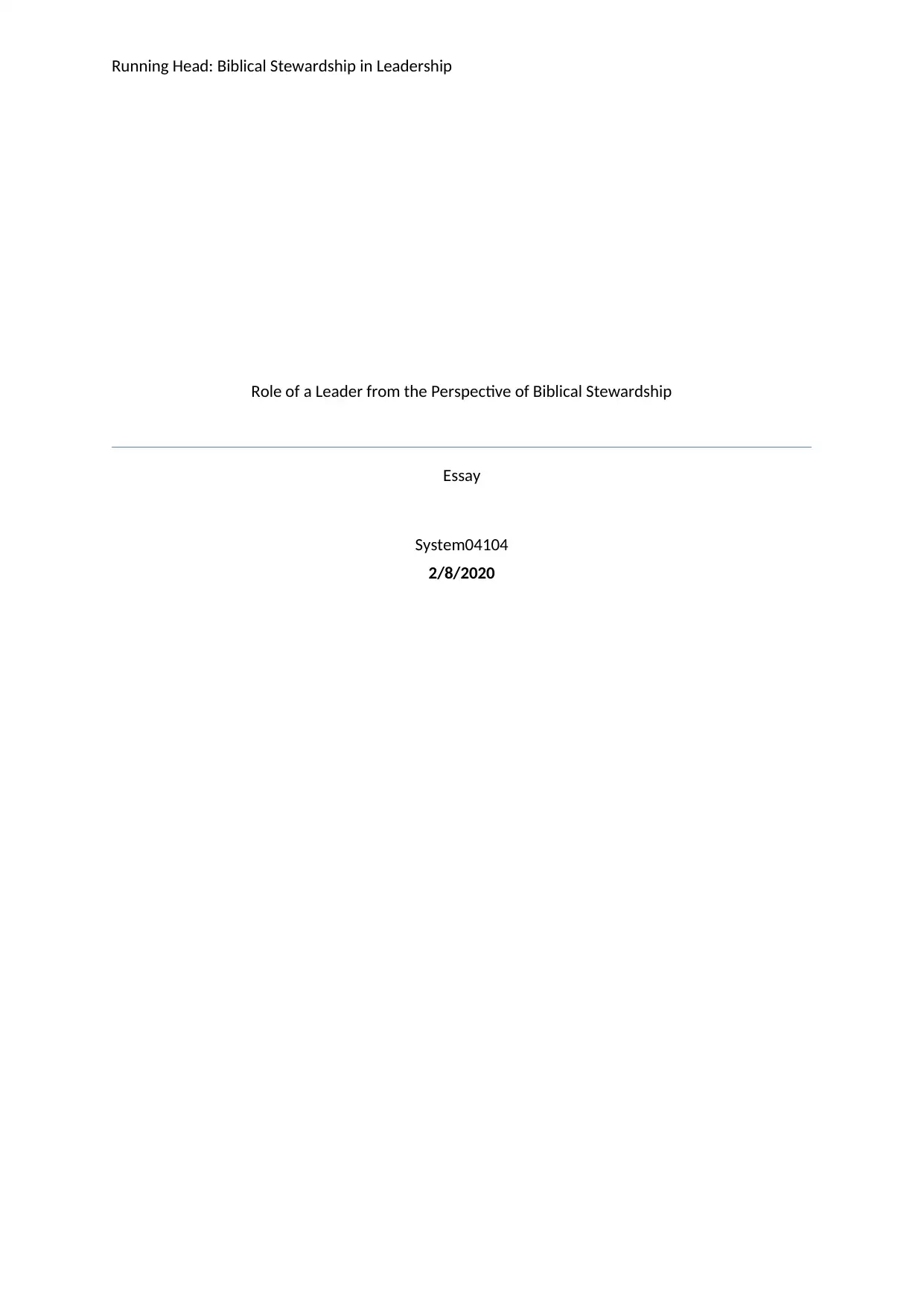
Running Head: Biblical Stewardship in Leadership
Role of a Leader from the Perspective of Biblical Stewardship
Essay
System04104
2/8/2020
Role of a Leader from the Perspective of Biblical Stewardship
Essay
System04104
2/8/2020
Paraphrase This Document
Need a fresh take? Get an instant paraphrase of this document with our AI Paraphraser
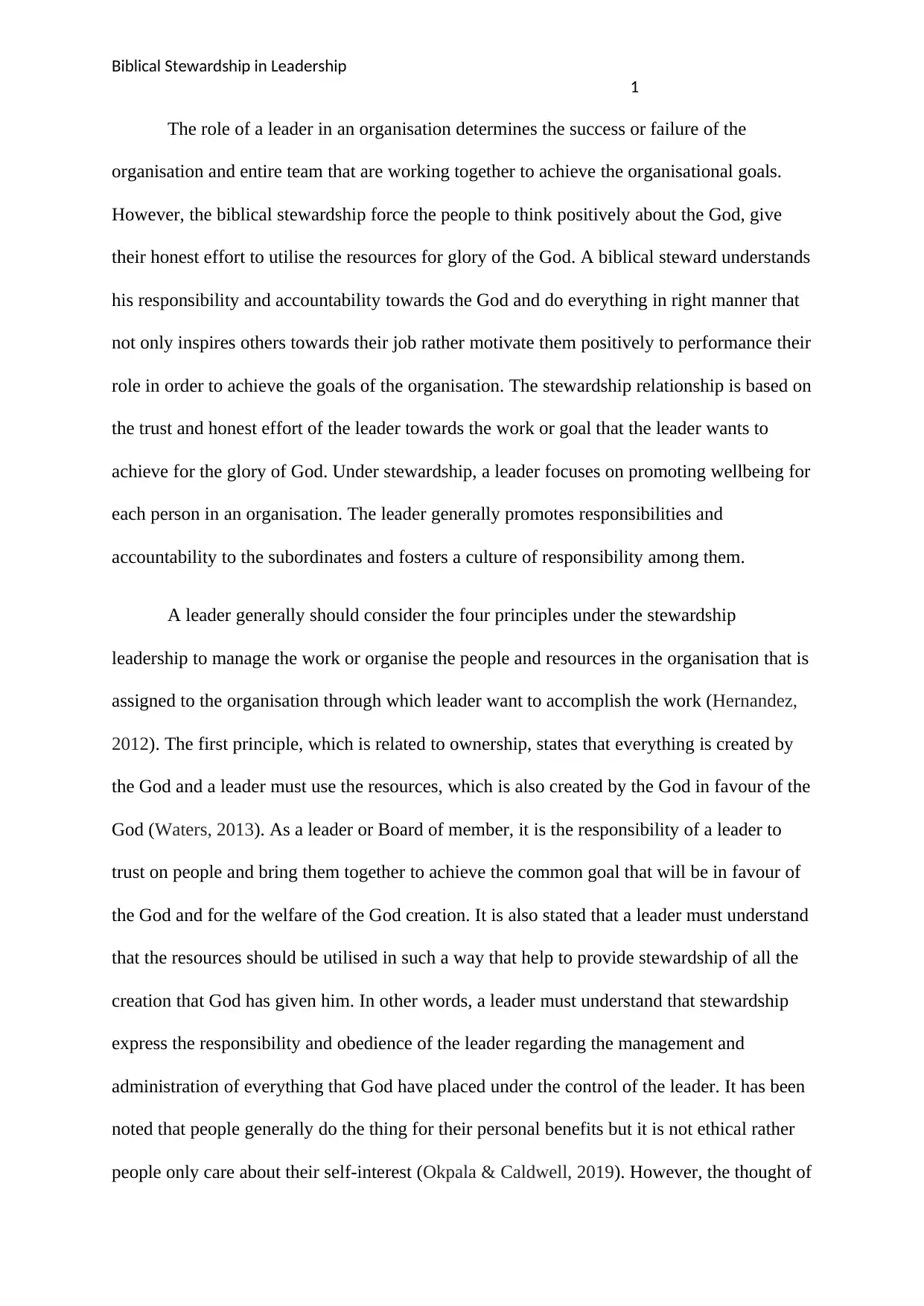
Biblical Stewardship in Leadership
1
The role of a leader in an organisation determines the success or failure of the
organisation and entire team that are working together to achieve the organisational goals.
However, the biblical stewardship force the people to think positively about the God, give
their honest effort to utilise the resources for glory of the God. A biblical steward understands
his responsibility and accountability towards the God and do everything in right manner that
not only inspires others towards their job rather motivate them positively to performance their
role in order to achieve the goals of the organisation. The stewardship relationship is based on
the trust and honest effort of the leader towards the work or goal that the leader wants to
achieve for the glory of God. Under stewardship, a leader focuses on promoting wellbeing for
each person in an organisation. The leader generally promotes responsibilities and
accountability to the subordinates and fosters a culture of responsibility among them.
A leader generally should consider the four principles under the stewardship
leadership to manage the work or organise the people and resources in the organisation that is
assigned to the organisation through which leader want to accomplish the work (Hernandez,
2012). The first principle, which is related to ownership, states that everything is created by
the God and a leader must use the resources, which is also created by the God in favour of the
God (Waters, 2013). As a leader or Board of member, it is the responsibility of a leader to
trust on people and bring them together to achieve the common goal that will be in favour of
the God and for the welfare of the God creation. It is also stated that a leader must understand
that the resources should be utilised in such a way that help to provide stewardship of all the
creation that God has given him. In other words, a leader must understand that stewardship
express the responsibility and obedience of the leader regarding the management and
administration of everything that God have placed under the control of the leader. It has been
noted that people generally do the thing for their personal benefits but it is not ethical rather
people only care about their self-interest (Okpala & Caldwell, 2019). However, the thought of
1
The role of a leader in an organisation determines the success or failure of the
organisation and entire team that are working together to achieve the organisational goals.
However, the biblical stewardship force the people to think positively about the God, give
their honest effort to utilise the resources for glory of the God. A biblical steward understands
his responsibility and accountability towards the God and do everything in right manner that
not only inspires others towards their job rather motivate them positively to performance their
role in order to achieve the goals of the organisation. The stewardship relationship is based on
the trust and honest effort of the leader towards the work or goal that the leader wants to
achieve for the glory of God. Under stewardship, a leader focuses on promoting wellbeing for
each person in an organisation. The leader generally promotes responsibilities and
accountability to the subordinates and fosters a culture of responsibility among them.
A leader generally should consider the four principles under the stewardship
leadership to manage the work or organise the people and resources in the organisation that is
assigned to the organisation through which leader want to accomplish the work (Hernandez,
2012). The first principle, which is related to ownership, states that everything is created by
the God and a leader must use the resources, which is also created by the God in favour of the
God (Waters, 2013). As a leader or Board of member, it is the responsibility of a leader to
trust on people and bring them together to achieve the common goal that will be in favour of
the God and for the welfare of the God creation. It is also stated that a leader must understand
that the resources should be utilised in such a way that help to provide stewardship of all the
creation that God has given him. In other words, a leader must understand that stewardship
express the responsibility and obedience of the leader regarding the management and
administration of everything that God have placed under the control of the leader. It has been
noted that people generally do the thing for their personal benefits but it is not ethical rather
people only care about their self-interest (Okpala & Caldwell, 2019). However, the thought of
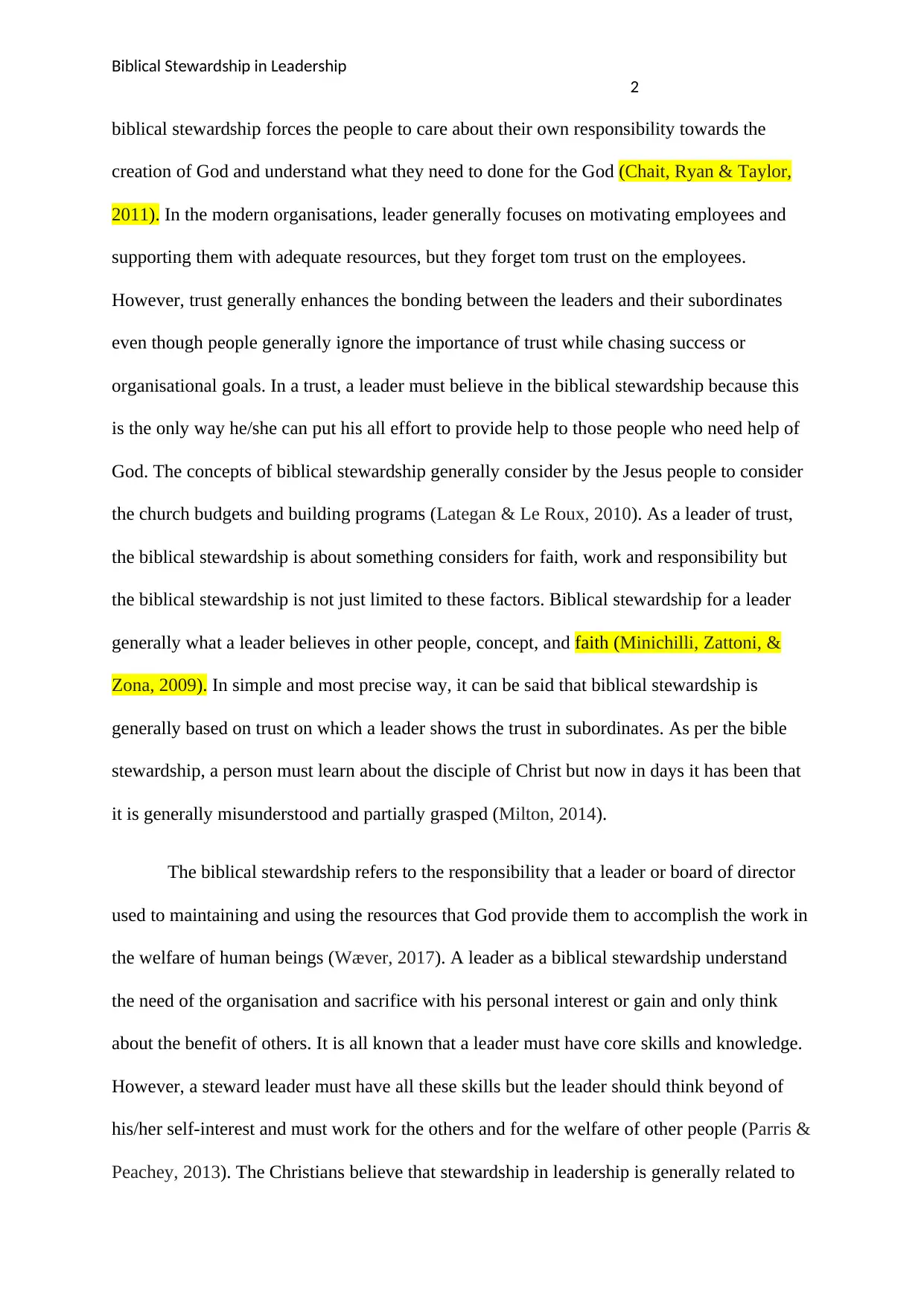
Biblical Stewardship in Leadership
2
biblical stewardship forces the people to care about their own responsibility towards the
creation of God and understand what they need to done for the God (Chait, Ryan & Taylor,
2011). In the modern organisations, leader generally focuses on motivating employees and
supporting them with adequate resources, but they forget tom trust on the employees.
However, trust generally enhances the bonding between the leaders and their subordinates
even though people generally ignore the importance of trust while chasing success or
organisational goals. In a trust, a leader must believe in the biblical stewardship because this
is the only way he/she can put his all effort to provide help to those people who need help of
God. The concepts of biblical stewardship generally consider by the Jesus people to consider
the church budgets and building programs (Lategan & Le Roux, 2010). As a leader of trust,
the biblical stewardship is about something considers for faith, work and responsibility but
the biblical stewardship is not just limited to these factors. Biblical stewardship for a leader
generally what a leader believes in other people, concept, and faith (Minichilli, Zattoni, &
Zona, 2009). In simple and most precise way, it can be said that biblical stewardship is
generally based on trust on which a leader shows the trust in subordinates. As per the bible
stewardship, a person must learn about the disciple of Christ but now in days it has been that
it is generally misunderstood and partially grasped (Milton, 2014).
The biblical stewardship refers to the responsibility that a leader or board of director
used to maintaining and using the resources that God provide them to accomplish the work in
the welfare of human beings (Wæver, 2017). A leader as a biblical stewardship understand
the need of the organisation and sacrifice with his personal interest or gain and only think
about the benefit of others. It is all known that a leader must have core skills and knowledge.
However, a steward leader must have all these skills but the leader should think beyond of
his/her self-interest and must work for the others and for the welfare of other people (Parris &
Peachey, 2013). The Christians believe that stewardship in leadership is generally related to
2
biblical stewardship forces the people to care about their own responsibility towards the
creation of God and understand what they need to done for the God (Chait, Ryan & Taylor,
2011). In the modern organisations, leader generally focuses on motivating employees and
supporting them with adequate resources, but they forget tom trust on the employees.
However, trust generally enhances the bonding between the leaders and their subordinates
even though people generally ignore the importance of trust while chasing success or
organisational goals. In a trust, a leader must believe in the biblical stewardship because this
is the only way he/she can put his all effort to provide help to those people who need help of
God. The concepts of biblical stewardship generally consider by the Jesus people to consider
the church budgets and building programs (Lategan & Le Roux, 2010). As a leader of trust,
the biblical stewardship is about something considers for faith, work and responsibility but
the biblical stewardship is not just limited to these factors. Biblical stewardship for a leader
generally what a leader believes in other people, concept, and faith (Minichilli, Zattoni, &
Zona, 2009). In simple and most precise way, it can be said that biblical stewardship is
generally based on trust on which a leader shows the trust in subordinates. As per the bible
stewardship, a person must learn about the disciple of Christ but now in days it has been that
it is generally misunderstood and partially grasped (Milton, 2014).
The biblical stewardship refers to the responsibility that a leader or board of director
used to maintaining and using the resources that God provide them to accomplish the work in
the welfare of human beings (Wæver, 2017). A leader as a biblical stewardship understand
the need of the organisation and sacrifice with his personal interest or gain and only think
about the benefit of others. It is all known that a leader must have core skills and knowledge.
However, a steward leader must have all these skills but the leader should think beyond of
his/her self-interest and must work for the others and for the welfare of other people (Parris &
Peachey, 2013). The Christians believe that stewardship in leadership is generally related to
⊘ This is a preview!⊘
Do you want full access?
Subscribe today to unlock all pages.

Trusted by 1+ million students worldwide
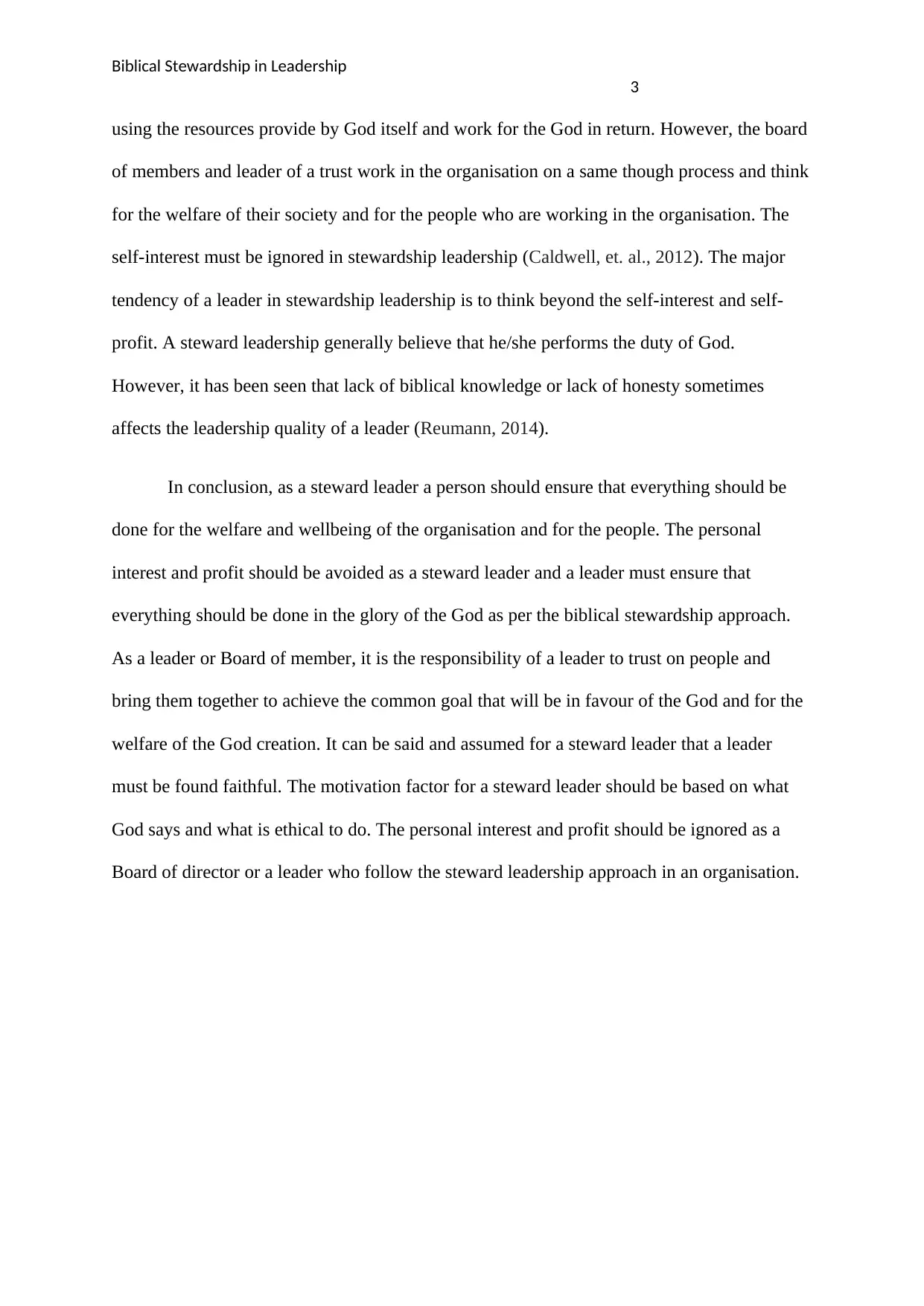
Biblical Stewardship in Leadership
3
using the resources provide by God itself and work for the God in return. However, the board
of members and leader of a trust work in the organisation on a same though process and think
for the welfare of their society and for the people who are working in the organisation. The
self-interest must be ignored in stewardship leadership (Caldwell, et. al., 2012). The major
tendency of a leader in stewardship leadership is to think beyond the self-interest and self-
profit. A steward leadership generally believe that he/she performs the duty of God.
However, it has been seen that lack of biblical knowledge or lack of honesty sometimes
affects the leadership quality of a leader (Reumann, 2014).
In conclusion, as a steward leader a person should ensure that everything should be
done for the welfare and wellbeing of the organisation and for the people. The personal
interest and profit should be avoided as a steward leader and a leader must ensure that
everything should be done in the glory of the God as per the biblical stewardship approach.
As a leader or Board of member, it is the responsibility of a leader to trust on people and
bring them together to achieve the common goal that will be in favour of the God and for the
welfare of the God creation. It can be said and assumed for a steward leader that a leader
must be found faithful. The motivation factor for a steward leader should be based on what
God says and what is ethical to do. The personal interest and profit should be ignored as a
Board of director or a leader who follow the steward leadership approach in an organisation.
3
using the resources provide by God itself and work for the God in return. However, the board
of members and leader of a trust work in the organisation on a same though process and think
for the welfare of their society and for the people who are working in the organisation. The
self-interest must be ignored in stewardship leadership (Caldwell, et. al., 2012). The major
tendency of a leader in stewardship leadership is to think beyond the self-interest and self-
profit. A steward leadership generally believe that he/she performs the duty of God.
However, it has been seen that lack of biblical knowledge or lack of honesty sometimes
affects the leadership quality of a leader (Reumann, 2014).
In conclusion, as a steward leader a person should ensure that everything should be
done for the welfare and wellbeing of the organisation and for the people. The personal
interest and profit should be avoided as a steward leader and a leader must ensure that
everything should be done in the glory of the God as per the biblical stewardship approach.
As a leader or Board of member, it is the responsibility of a leader to trust on people and
bring them together to achieve the common goal that will be in favour of the God and for the
welfare of the God creation. It can be said and assumed for a steward leader that a leader
must be found faithful. The motivation factor for a steward leader should be based on what
God says and what is ethical to do. The personal interest and profit should be ignored as a
Board of director or a leader who follow the steward leadership approach in an organisation.
Paraphrase This Document
Need a fresh take? Get an instant paraphrase of this document with our AI Paraphraser
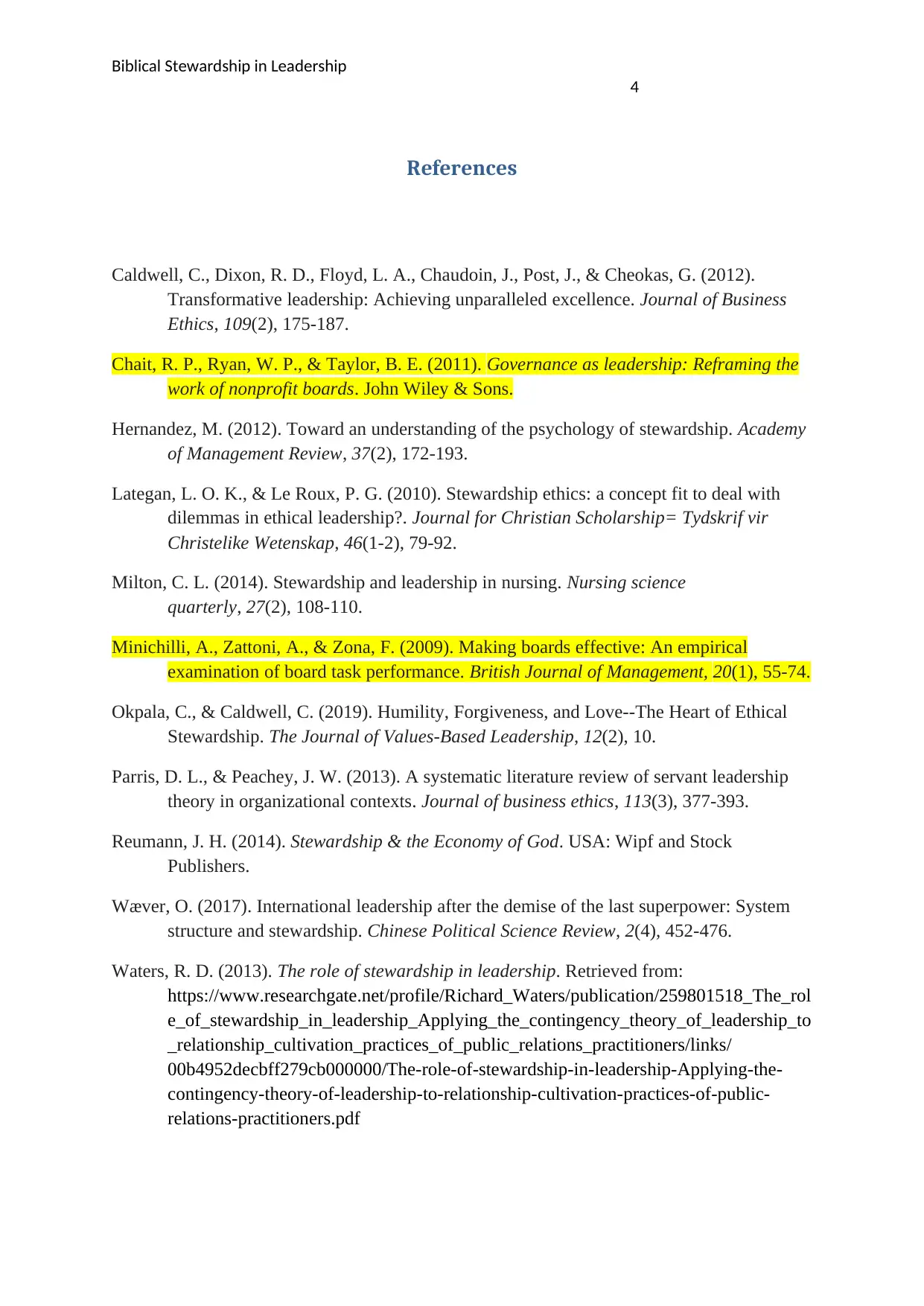
Biblical Stewardship in Leadership
4
References
Caldwell, C., Dixon, R. D., Floyd, L. A., Chaudoin, J., Post, J., & Cheokas, G. (2012).
Transformative leadership: Achieving unparalleled excellence. Journal of Business
Ethics, 109(2), 175-187.
Chait, R. P., Ryan, W. P., & Taylor, B. E. (2011). Governance as leadership: Reframing the
work of nonprofit boards. John Wiley & Sons.
Hernandez, M. (2012). Toward an understanding of the psychology of stewardship. Academy
of Management Review, 37(2), 172-193.
Lategan, L. O. K., & Le Roux, P. G. (2010). Stewardship ethics: a concept fit to deal with
dilemmas in ethical leadership?. Journal for Christian Scholarship= Tydskrif vir
Christelike Wetenskap, 46(1-2), 79-92.
Milton, C. L. (2014). Stewardship and leadership in nursing. Nursing science
quarterly, 27(2), 108-110.
Minichilli, A., Zattoni, A., & Zona, F. (2009). Making boards effective: An empirical
examination of board task performance. British Journal of Management, 20(1), 55-74.
Okpala, C., & Caldwell, C. (2019). Humility, Forgiveness, and Love--The Heart of Ethical
Stewardship. The Journal of Values-Based Leadership, 12(2), 10.
Parris, D. L., & Peachey, J. W. (2013). A systematic literature review of servant leadership
theory in organizational contexts. Journal of business ethics, 113(3), 377-393.
Reumann, J. H. (2014). Stewardship & the Economy of God. USA: Wipf and Stock
Publishers.
Wæver, O. (2017). International leadership after the demise of the last superpower: System
structure and stewardship. Chinese Political Science Review, 2(4), 452-476.
Waters, R. D. (2013). The role of stewardship in leadership. Retrieved from:
https://www.researchgate.net/profile/Richard_Waters/publication/259801518_The_rol
e_of_stewardship_in_leadership_Applying_the_contingency_theory_of_leadership_to
_relationship_cultivation_practices_of_public_relations_practitioners/links/
00b4952decbff279cb000000/The-role-of-stewardship-in-leadership-Applying-the-
contingency-theory-of-leadership-to-relationship-cultivation-practices-of-public-
relations-practitioners.pdf
4
References
Caldwell, C., Dixon, R. D., Floyd, L. A., Chaudoin, J., Post, J., & Cheokas, G. (2012).
Transformative leadership: Achieving unparalleled excellence. Journal of Business
Ethics, 109(2), 175-187.
Chait, R. P., Ryan, W. P., & Taylor, B. E. (2011). Governance as leadership: Reframing the
work of nonprofit boards. John Wiley & Sons.
Hernandez, M. (2012). Toward an understanding of the psychology of stewardship. Academy
of Management Review, 37(2), 172-193.
Lategan, L. O. K., & Le Roux, P. G. (2010). Stewardship ethics: a concept fit to deal with
dilemmas in ethical leadership?. Journal for Christian Scholarship= Tydskrif vir
Christelike Wetenskap, 46(1-2), 79-92.
Milton, C. L. (2014). Stewardship and leadership in nursing. Nursing science
quarterly, 27(2), 108-110.
Minichilli, A., Zattoni, A., & Zona, F. (2009). Making boards effective: An empirical
examination of board task performance. British Journal of Management, 20(1), 55-74.
Okpala, C., & Caldwell, C. (2019). Humility, Forgiveness, and Love--The Heart of Ethical
Stewardship. The Journal of Values-Based Leadership, 12(2), 10.
Parris, D. L., & Peachey, J. W. (2013). A systematic literature review of servant leadership
theory in organizational contexts. Journal of business ethics, 113(3), 377-393.
Reumann, J. H. (2014). Stewardship & the Economy of God. USA: Wipf and Stock
Publishers.
Wæver, O. (2017). International leadership after the demise of the last superpower: System
structure and stewardship. Chinese Political Science Review, 2(4), 452-476.
Waters, R. D. (2013). The role of stewardship in leadership. Retrieved from:
https://www.researchgate.net/profile/Richard_Waters/publication/259801518_The_rol
e_of_stewardship_in_leadership_Applying_the_contingency_theory_of_leadership_to
_relationship_cultivation_practices_of_public_relations_practitioners/links/
00b4952decbff279cb000000/The-role-of-stewardship-in-leadership-Applying-the-
contingency-theory-of-leadership-to-relationship-cultivation-practices-of-public-
relations-practitioners.pdf

Biblical Stewardship in Leadership
5
5
⊘ This is a preview!⊘
Do you want full access?
Subscribe today to unlock all pages.

Trusted by 1+ million students worldwide
1 out of 6
Related Documents
Your All-in-One AI-Powered Toolkit for Academic Success.
+13062052269
info@desklib.com
Available 24*7 on WhatsApp / Email
![[object Object]](/_next/static/media/star-bottom.7253800d.svg)
Unlock your academic potential
Copyright © 2020–2025 A2Z Services. All Rights Reserved. Developed and managed by ZUCOL.





